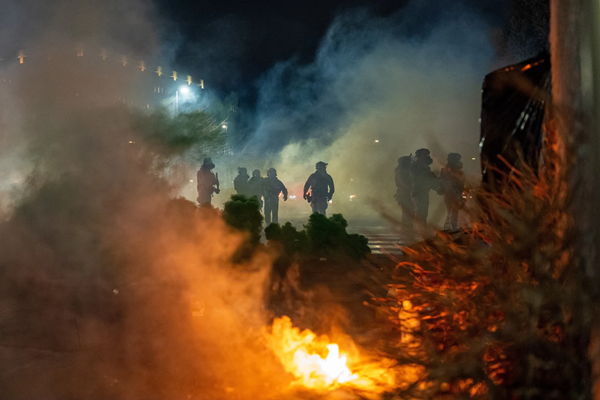Federal oversight of special education in New Orleans could soon end
A decade of court oversight of special education services in New Orleans public schools, the result of a legal settlement, will most likely cease by the end of the year, the judge presiding over the legal settlement said Wednesday.
The decision, if it comes to pass, would come at the request of the Louisiana Department of Education and the Orleans Parish School Board, which have been subjected to intensive monitoring under a consent decree since 2015. The agreement settled a 2010 class-action lawsuit that alleged the city’s charter schools discriminated against special education students in their application processes and did not provide them appropriate educational services, as federal law requires.
The case was brought by the Southern Poverty Law Center on behalf of parents and guardians of special-needs students in New Orleans schools. Though problems with special education continue to be identified at some New Orleans charter schools, the consent decree was intended to address systemic issues — whether the state and district are catching those issues and implementing plans to correct them — not individual students’ experiences, said U.S. District Judge Jay Zainey.
For the past eight years, an independent monitor assigned by the court has found the defendants — the Department of Education and OPSB — in substantial compliance with all provisions outlined in consent decree. Citing those findings, the state and school board earlier this year formally requested an end to the agreement.
The plaintiffs oppose terminating the settlement, arguing that the state and NOLA Public Schools district have not created sufficient monitoring, oversight or complaint systems. Their opposition hinges on a 2024 report from the Louisiana Legislative Auditor that found faults in the state’s monitoring of special education programs — most districts self-reported their compliance with federal rules dictating education plans, without on-site monitoring. (However, some of those problems resulted from the fact that much of the state’s monitoring capacity has been directed toward New Orleans schools, possibly as a result of the consent decree, according to the audit report.) The audit also noted that the agency reduced the number of workers dedicated to special education between 2012 and 2019.
Lauren Winkler, lead attorney for the plaintiffs, said her team has asked the district to make it easier for parents to bring issues about schools forward to the central office through creating an open complaint system on their website. That was never implemented.
“(There are) really simple solutions that are not super costly,” Winkler said. “We tried to meet with them to agree to some and they just wouldn’t.”
Winkler said noncompliance still exists in the schools. More people contacted the SPLC about their negative experiences with New Orleans schools’ special education programs ahead of this week’s hearing.
“If we didn’t have any parents coming forward with issues, we’d maybe have a different position,” Winkler said. “With the breadth of issues in the amount of people that came to us, as we’ve been preparing for this, I think that’s indicative of the systemic issues that are still here.”
But in a court filing last week, Zainey wrote that the court anticipates ending federal oversight by the end of the year.
“The consent judgement was a temporary measure and was never meant to be a permanent fixture of the school system,” Zainey said in court. “Things have been much improved from how they used to be in Orleans Parish.”
Zainey invited parents to share their experiences with the court and representatives from the LDOE and Orleans Parish School Board during informal hearings on Nov. 12 and 13. Most parents asked the court to continue the federal monitoring of New Orleans schools, but it’s unclear whether their statements will change Zainey’s plans. Zainey encouraged the state’s ombudsman, who connects families with resources and informs them of their rights in relation to special education, to connect with parents following their statements.
But most of the parents speaking at the informal hearing were those who had already tried, and were still trying, to seek recourse through communication with district or state officials.
Grace Thompson spoke in front of the judge Wednesday morning about her son’s experience at Audubon Gentilly. According to Thompson, her son was supposed to receive speech therapy and a one-on-one aide to help in class, but never received them. Thompson said she’s tried to seek help through the district’s accountability office, which, she said, has offered little guidance and has been “slow” and “inconsistent” in its communications.
“I’ve literally been calling them for the last year and a half,” Thompson told the judge. “They know who I am.”
Steve Corbett, CEO of Audubon Schools, said Audubon Gentilly has provided students with all necessary services and has been found fully compliant with federal special education law. The most recent state special education monitoring report found “no unresolved areas of noncompliance” at the school.
Other parents also spoke of slow communication with the district and the schools their children attend. They said their children weren’t receiving the services outlined in their individualized education plans, that their learning has regressed, that schools were slow in performing evaluations and reevaluations, and that oversight was only afforded to children with parents that could be there to actively fight for them.
District Superintendent Fateama Fulmore and state representatives were present at the hearing. In response to hearing parent concerns, Fulmore said she appreciated the opportunity to hear from them directly and that her team will follow up.
“We have an obligation to every child in this system to get this right,” Fulmore said. “We are doing better.”
Lyric Lee, a former student at Morris Jeff Community School who had an IEP and graduated last year, said she learned at a young age how to advocate for herself, her brother and other students who have special needs. She said the consent decree should continue.
“I’ve learned when people are not kept on a watch, they feel like they don’t have to do it, and they’ll do everything possible to make sure they don’t have to,” Lee said.
___
This story was originally published by Verite News and distributed through a partnership with The Associated Press.



